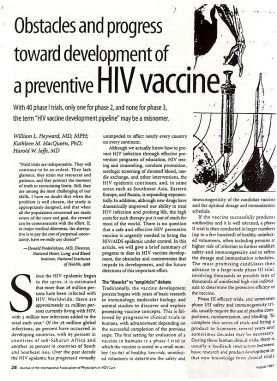CDC leader with secret VaxGen deal campaigned for trials like AidsVax
Brian Deer’s investigation of the claimed “world’s first AIDS vaccine” unearthed a shocking secret deal between the VaxGen company and a senior manager at the US government’s Centers for Disease Control, Dr William Heyward. The result was a federal prosecution.
An influential paper by Dr William Heyward et al, from the US Centers for Disease Control, published in the Journal of the International Association of Physicians in Aids Care in August 1997, caricatured scientific debates over Aids vaccines as between “theorists” and “empiricists”. Lambasting the “theorists” – including scientists at the National Institutes of Health and academic institutions worldwide – the paper cheered the “empiricists”, who in the face of basic problems “argue that it is only through phase III efficacy trials that such dilemmas may be resolved, or that these perceived obstacles may in fact turn out to be irrelevant”.
The article was one of a series which contributed to Heyward’s subsequent disgrace, after it was discovered later that he had concealed a deal to join VaxGen Inc, the only company to be preparing such a trial. In October 1998, a VaxGen-sponsored supplement to the journal Aids Research and Human Retroviruses continued to hammer his message, this time roping-in an official of the Food and Drug Administration. Here, Heyward spoke of the “so-called ‘theorists’, who feel that more knowledge is necessary before we can intelligently proceed with vaccine development, and the ’empiricists’, who take a more pragmatic, but cautious, trial-and-error approach and feel that some of the current candidate vaccines deserve to be tested in large-scale trials.” This section is footnoted to the article refered to above.
Both articles, along with various conference interventions, track back to yet another crusading text, published by Heyward and Dr Jose Esparza, HIV vaccine coordinator at UNAIDS and the World Health Organization. [Jose Esparza was later to attempt a crucial intervention for the company in February 2003, spinning the failure of VaxGen’s phase III trial as a success.] In the journal Aids in 1996 (10(auppl A, s123-132) the two men used their prestige to campaign for trials thus:
“Some proponents feel that further basic research is needed and maintain that efficacy trials should not be initiated until we have a better understanding of the immune correlates of protection against HIV infection in humans, and new candidate vaccines are developed based on such information. Others argue that some of the existing candidate vaccines based on envelope recombinant proteins have been shown to induce protective immunity in chimpanzees, are safe and immunogenic in Phase I/II trials in humans, and are reasonable candidate vaccines available now for Phase III efficacy trials. In this article we propose that a parallel development process – additional basic research of different vaccine concepts in close interaction with vaccine efficacy trials – may represent the most rational approach to accelerate the process of HIV vaccine development.”
Only one phase III trial was to happen in the forseeable future: that of VaxGen’s AidsVax, which later featured in the 1999 Sunday Times investigation The VaxGen Experiment by Brian Deer. Under Heyward’s leadership, CDC lobbied other government agencies to support VaxGen, allocated $8m in CDC grants to the phase III and gave the company vital credibility with private investors. But Heyward was secretly engaged to join the company as vice-president, and after Deer supplied documents to the federal inspector general for health and human services, Heyward was prosecuted and plea-bargained a $32,500 fine.

